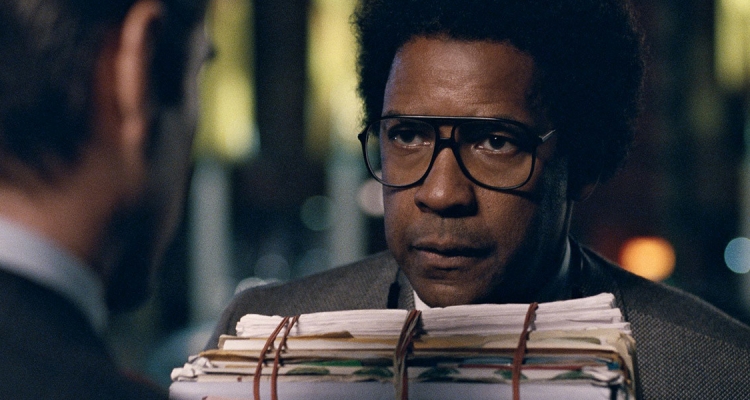TORONTO – Some films are simply hard to wrap your head around. Keep that in mind as we discuss Dan Gilroy’s new drama “Roman J. Israel, Esq.” which debuted Sunday night at the 2017 Toronto Film Festival.
Hours after screening it, ‘Roman’ still leaves you puzzled. The movie features another impressive and, at times, moving performance by Denzel Washington. It also seemingly wants to make statements on the unequal treatment defendants face in the American legal system (in this case, in Los Angeles specifically), the obvious financial discrepancy between different law firms that specialize in representing lower income criminal defendants and, to a lesser point, consider the difficulty ‘60s radicals face trying to fight the good fight alongside a completely different generation of contemporary protesters. All valid and worthy topics to tackle and, yet, why does it feel like other parts of the film are distinctly problematic?

‘Roman’ focuses on the character of the film’s title (Washington) that has worked for over 30 years at a small law firm that specializes in helping defendants who can’t always afford the most expensive legal option (which means Roman is pretty poor for a lawyer). When his legal partner, William Henry Jackson (never really seen fully) has a heart attack, Roman is forced to represent their clients in court, something he hasn’t done in decades preferring to consult and provide strategy in the background. His business partner’s health declines rapidly and Jackson’s daughter Lynn (Amanda Warren, makes an impression) informs Roman that they will be closing down the firm because unbeknownst to him it has been haemorrhaging money for years. She introduces Roman to George (Colin Farrell, solid), a former student of her father’s who is a partner in a more profitable firm and has agreed to help her close the books.
Shocked by his new set of circumstances, Roman begins the search for a new position. This journey eventually introduces him to a lawyer at a non-profit advocacy group (Carmen Ejogo, very good) who doesn’t have the means to hire him, but is clearly intrigued by his experience and ability to articulate so much legalese so quickly. He soon becomes desperate to find a new position and has to bite his tongue taking the offer to work at the same larger firm George does after initially turning him down.
When Roman is handed an unexpectedly lucrative opportunity he takes it full well knowing he’s putting himself in a very dangerous position. But for a very short period of time Roman gets to live a bit of the glamorous life that always seemed out of reach to him. That is until reality decides to smack him in the face.
Gilroy has fashioned a character study that has moments that are incredibly well written. The dialogue is fresh and snaps, but in a manner more realistic than any of Aaron Sorkin’s often melodic banter. What’s extremely disappointing is that the screenplay’s through line is simply not that interesting. Roman may suffer from a bit of Asperger’s syndrome. He may live an existence where he still keeps all his music (8,000 songs) on an old, first generation iPod. He may have no idea how to text or respond to his E-mail. What’s disconcerting is that so little that happens to him is that interesting. The throughline for Gilroy’s screenplay is almost too simple for the circumstances that envelope Roman.
READ MORE: Jessica Chastain Moves Like A (Card) Shark In ‘Molly’s Game’ [TIFF Review]
Moreover, it feels like Gilroy is always on the verge of tackling something great and then veers off to something else. It could be the aforementioned corruption of the criminal justice system or the delicate balance of living in 2017 Los Angeles as a minority. The film even hints at proving commentary on the gentrification of downtown LA. It just doesn’t really want to truly go there on any of those subjects.

What makes ‘Roman’ something to appreciate is Washington’s absolutely committed portrayal. This is a transformative Washington. He’s created a character that may be less like the celebrated actor than any role he’s played over the past decade. Washington wonderfully balances Roman’s obsessive tendencies without ever coming near a line that might suggest that Roman is any sort of caricature (something entirely possible based on Gilroy’s script).
READ MORE: High Fidelity Doesn’t Help Denzel Washington’s Padlocked ‘Fences’ [Review]
In one scene Roman appears to be having an everyday conversation about his concerns about finding a new job. As his voice stays steady a single tear – almost unnoticed by the other character in the scene – drops from under his thick rimmed classes. It’s a master class of the art of acting that simply can’t be ignored.
And yet, as the film continues some of Gilroy’s choices seem so dated or strange they begin to distract from the proceedings. Why is George, an obviously rich and successful white man, often Roman’s savior? Why does Roman seem to have no family backstory? Why does the threat to Roman in the film come from an African-American character that is exactly the sort of cliché we believe Gilroy and Washington are trying to avoid? Why is the character Roman convinces to see the value in pro bono work another white guy?
These are obvious questions that you think Gilroy would easily address or avoid, but strangely doesn’t. So, excuse us as we continue to try to wrap our head around all of this. Beyond Washington’s stunning performance we’re still sort of puzzled by it all. [B-]
Click here for our complete coverage of the 2017 Toronto International Film Festival


